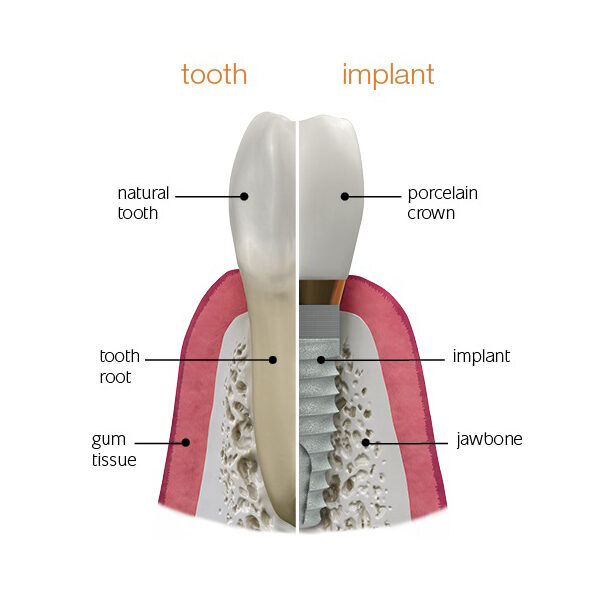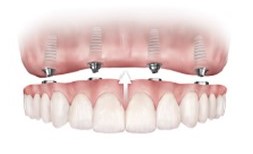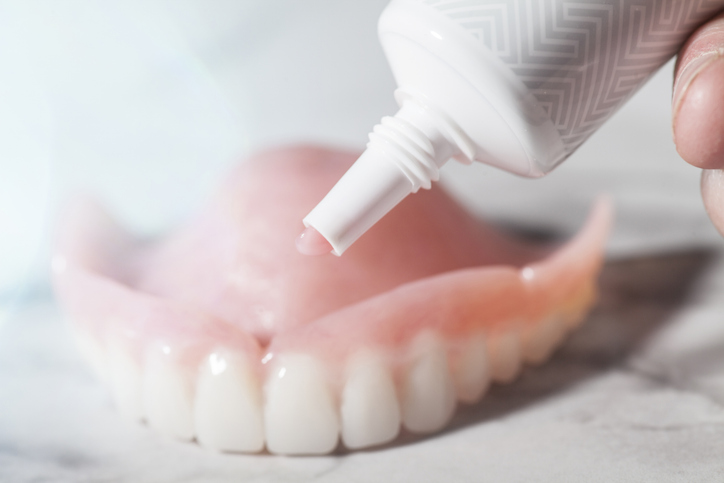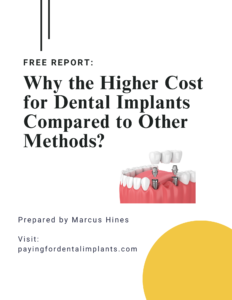Physical Address
12245 Cypress Spring Road, Clarksburg, MD 20871
Physical Address
12245 Cypress Spring Road, Clarksburg, MD 20871

In this article we will break down the expenses involved, both for a single tooth and for full mouth dental implants.
Last updated on May 16th, 2025 at 07:53 am
If you’ve ever faced the loss of a tooth or multiple teeth and weighed your options for replacement, you know that the cost of dental implants can seem high. Fortunately, dental implants offer a reliable and long-lasting solution making them a wise investment. In this article we will break down the expenses involved, both for a single tooth and for full mouth dental implants.
Replacing a missing tooth with a dental implant has become the gold standard of tooth replacement. On average, you can expect to pay:
| Single Dental Implant | Cost |
| Including implant, abutment and crown | $3,500 – $6,000 |
While this might seem like a considerable investment, it is important to think about the long-term benefits of implant over the alternatives.
Fixed bridgework, flippers and partial dentures are lower priced alternative tooth replacement methods. Rest assured, a dental implant is your best tooth replacement option of them all, in spite of its higher initial cost. An implant’s ability to mimic the function and look of a natural tooth is unmatched.
Dental implants are designed to last much longer than its alternative tooth replacement methods, potentially for the rest of your life, with proper care.
Replacing a single tooth with a dental implant involves a few components as diagramed in Figure 1:

Figure 1: Dental implant compared to a natural tooth.
Unlike other missing tooth replacement options, such as bridges and partial-dentures, implants integrate with your jawbone. Osseointegration is the technical term. This provides superior stability and prevents bone loss that can occur with bridges and dentures.
If you need to replace an entire set of teeth in either your upper or lower jaw, or both, full mouth dental implants—often referred to as TeethXpress® or All-on-4™—is considered the supreme long-term solutions. See Figure 2.
This method involves placing four to six implants in the jaw and attaching a full set of replacement teeth to the implants. The full set of teeth are anchored down to the implants and ensures a secure and natural-looking smile.

Figure 2: Full mouth dental implants require four to six implants.
The cost for full mouth dental implants can range as follows:
| Full Arch Dental Implants | Cost |
| Upper or lower jaw | $21,000 – $30,000 |
| Upper and lower jaw | $42,000 – $60,000 |
This might sound steep, but considering the alternative, removable dentures, full mouth dental implants are a worthwhile investment.
We will help you understand the downsides of traditional removable dentures later in the article.
Besides, there are several ways to make your full mouth dental implants feasible if you are committed.
Consider how Karen made her dental implants affordable as a manager of a pizza joint.
It is worth noting that the full mouth dental implant procedure does not require a dental implant for every missing tooth. The ability to use as few as four to six dental implants to support a full set of 14 teeth helps the dentist to keep the cost of this procedure down.
Fewer implants also make it easier for you to cleanse the areas beneath the teeth each day.
Dental implant prices can vary widely — even from one neighborhood to the next. Here are the biggest factors that influence how much you’ll end up paying:
Not all dental implant treatment is the same. A single-tooth implant is obviously less expensive than a full-mouth solution like All-on-4. If you need multiple implants, or a bridge supported by implants, the cost per tooth often decreases — but the total investment increases.
Some patients only need a dental implant post, abutment and crown. Others need a full-arch replacement with as few as four implants supporting an entire set of teeth. Naturally, the complexity of the procedure affects both the surgical time and the materials used — and that shows up in the final price.
Dental implants are made of highly durable materials like titanium (for the implant post) and zirconia or porcelain (for the visible tooth restoration). Higher-end materials tend to last longer and look more natural — but they also come with a higher price tag.
For example:
Choosing long-lasting, high-quality materials can lead to better long-term results and fewer replacements — which often saves money over time.
Dental implants are a precision procedure — and experience matters. Dental professionals with advanced bone and gum grafting, prosthetic and implant surgery training may usually command higher fees.
Implant dentists who perform a high volume of cases and use the latest digital technology (such as 3D scanning and guided surgery) tend to have higher fees, but their expertise may also reduce complications and need for future corrective treatment. This can save you money in the end.
In many instances grafting procedures are required before the dental implant surgery can be performed. Bone grafting and sinus lifts can add to the overall costs:
These procedures are crucial for long-term success, but they’re not always included in the “base” implant quote — so be sure to ask.
Durability and Longevity: Dental implants are built to last. With proper care, they can function quite similarly to your natural teeth for many years. This means fewer visits to the dentist for repairs or replacements when compared to bridgework and dentures.
Improved Oral Health: Implants help maintain the structure of your jawbone and prevent the bone loss that can occur with missing teeth.1 This not only keeps your face looking more natural but also supports the health of your remaining teeth.
Enhanced Quality of Life: Dental implants provide stability, allowing you to eat, speak, and smile with confidence. Unlike dentures, there’s no worry about implants slipping or causing discomfort.
The drawbacks of removable dentures are well documented. The cumulative cost and inconvenience of maintaining dentures, over time, can add up. Dentures can be uncomfortable, slip out of place, and require regular adjustments and replacements every four or five years.
While traditional removable dentures may seem like a more affordable alternative to implants—often priced between $1,200 to $1,500 for an upper or lower denture—initially denture come with several drawbacks:
Maintenance and Replacement: Dentures require regular maintenance and adjustments. They also need to be replaced every few years, leading to ongoing costs and inconveniences.
Use of Denture Adhesives: Dentures frequently require adhesives like Poligrip® and Fixodent® in order to achieve stability while eating, as seen in Figure 3. Denture adhesives can be messy and costly over an extended period of time.
Impact on Daily Life: Many denture wearers report difficulties with eating certain foods and speaking clearly. This can affect your overall quality of life and confidence.
For more details on this subject, check out our post on the Drawbacks of Long-Term Denture Use.

Figure 3: Denture adhesive glue being applied to a set of dentures.
A single dental implant typically costs between $3,500 and $6,000, depending on location, dentist experience, and whether bone grafting is required.
Dental implants involve high-quality materials (like titanium and porcelain), advanced surgical expertise, and often several appointments and procedures. While the upfront cost is higher, implants are built to last a lifetime.
A full arch restoration like All-on-4 or TeethXpress ranges from $21,000 to $30,000 per arch, depending on materials and your provider. Financing is often available.
Yes — options like bridges and removable dentures are less expensive upfront, but they typically need replacement every few years and don’t preserve jawbone health like implants do.
Some insurance plans will cover part of the dental implant cost. Other insurance plans may only help with extractions or crowns but not the implant itself. Be sure to ask your implant provider for specifics.
While the upfront cost of dental implants are usually priced higher than the alternatives, the long-term benefits make them a wise investment. Whether you need to replace a single tooth or a full set of teeth, dental implants offer a durable, natural-looking, and potentially a life-long solution.
Dental implants not only enhance your oral health but also improve your overall quality of life. When considering the long-term costs and inconveniences of traditional dentures, dental implants stand out as the best choice if you are seeking a permanent and comfortable solution for missing teeth.
If you’re considering dental implants, consult with your dentist to discuss your specific needs to receive a personalized treatment plan. Your function and your smile is well worth the it!
Sources

This will close in 0 seconds
This will close in 0 seconds
[…] Cost of Dental Implants […]
[…] dentist explained that dental implants are more expensive than dentures. He said implant teeth feel very natural and are fixed in place like natural teeth, […]
[…] cost of dental implants made Winston seriously reconsider replacing his six-year-old broken down partials dentures with a […]
[…] or several teeth and prefer dental implants? Does the cost seem close to being insurmountable? The cost of dental implants can range from $3,000 for a single dental implant up to $30,000 for a full set of upper or lower […]
[…] the cost of dental implants can help put insurance coverage in perspective. While the exact price can vary, a single dental […]